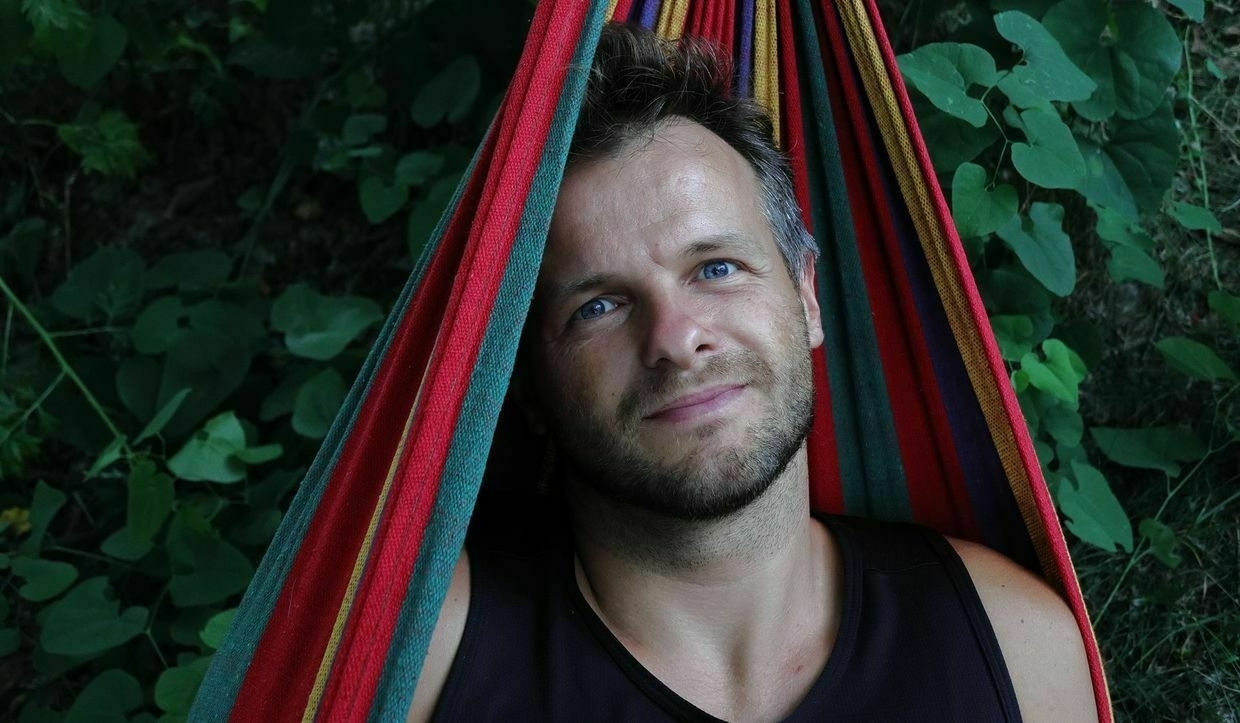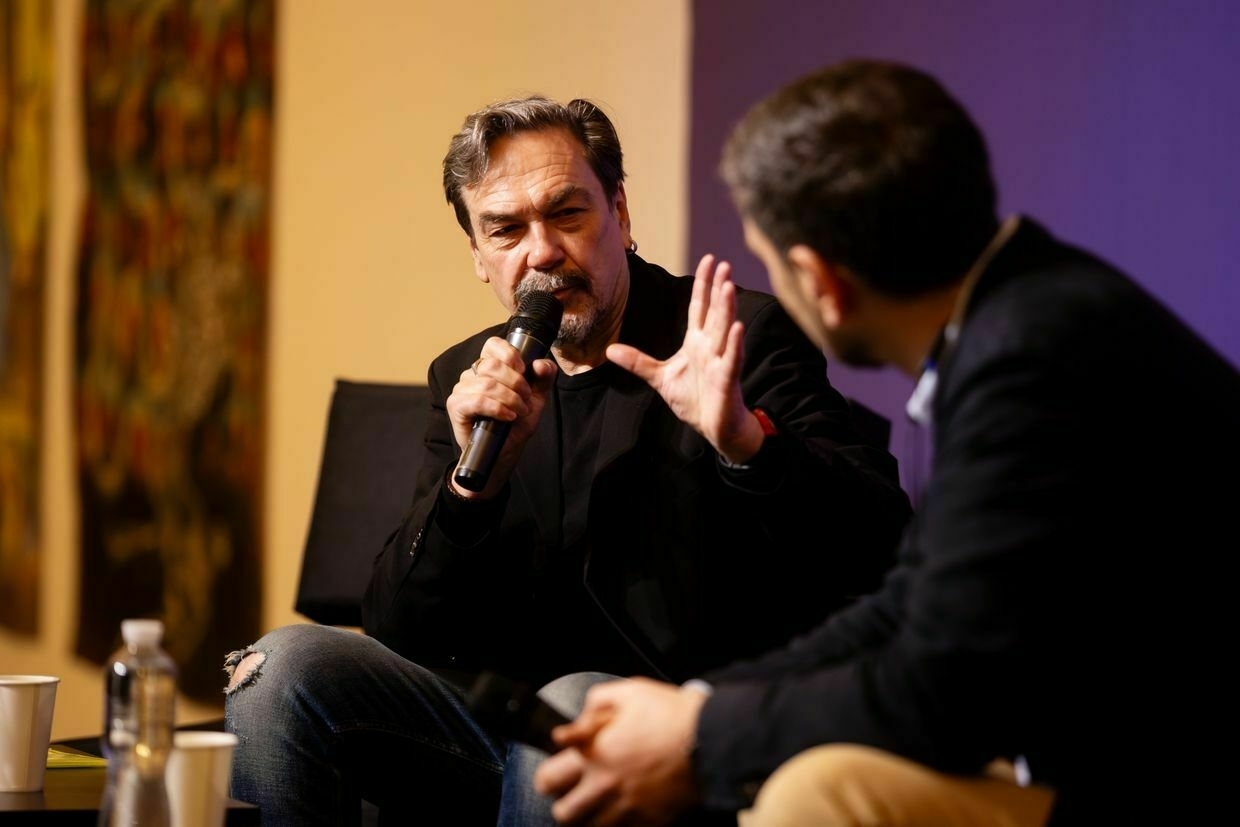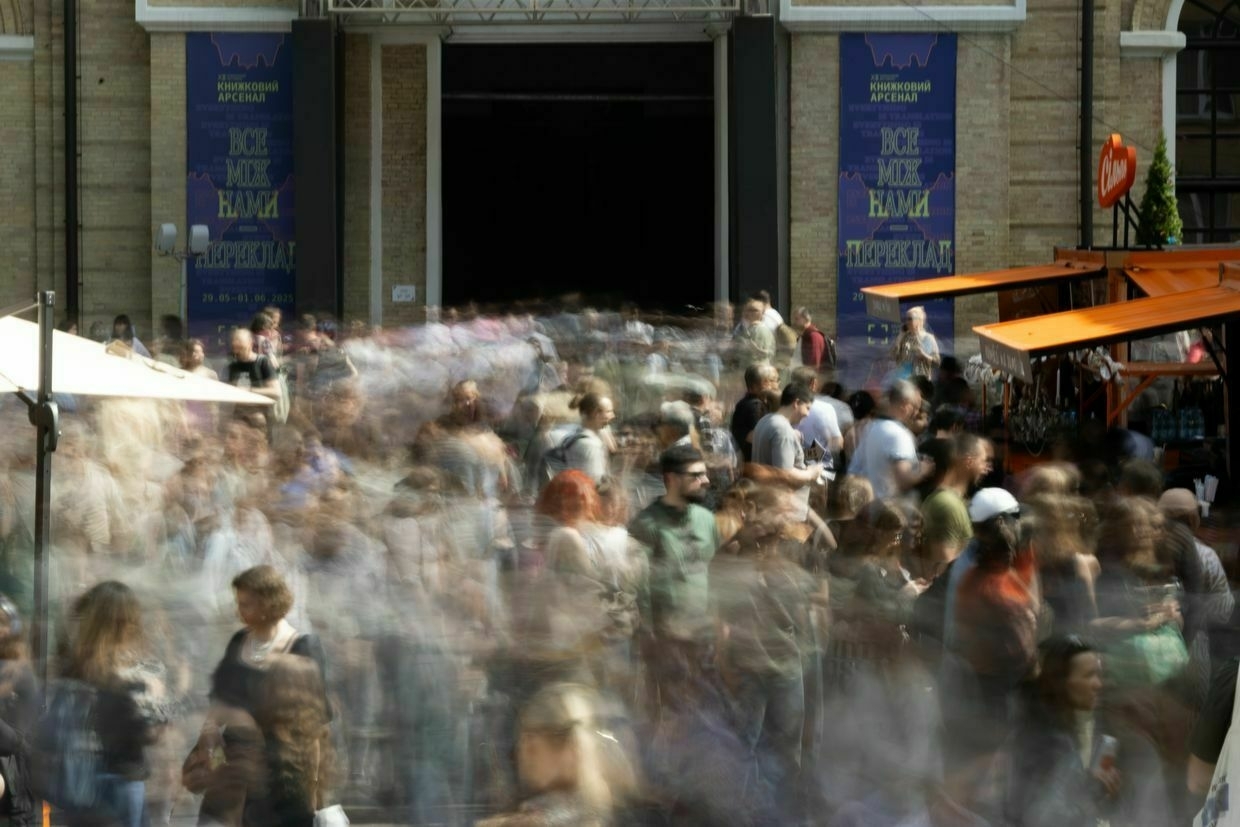
Since Russia launched its full-scale invasion of Ukraine in 2022, Ukrainian writers have found themselves grappling with questions not just of survival, but of voice, purpose, and audience.
Can one write fiction in the midst of war? Can creativity endure under air raid sirens and military mobilization? And what does it mean to speak to the world — especially when much of that world is only willing to listen to Ukrainians when the subject is war?
Artem Chapeye, a Ukrainian writer turned soldier, is among those navigating these questions firsthand. Known for his sharp nonfiction and fiction rooted in realism, Chapeye’s literary journey has shifted dramatically in recent years — from an early inability to read anything at all in 2022 to rediscovering language through science fiction and a growing urgency to write again.
In this conversation with the Kyiv Independent during the international Book Arsenal Festival, Ukraine’s largest literary event, Chapeye reflects on the creative cost of war, his fears that the world will only associate Ukraine with war, and the surprising role artificial intelligence might play in leveling the literary playing field for authors working in “small” languages.
This interview has been edited for length and clarity.
The Kyiv Independent: Military service can be both physically and mentally exhausting — do you still find time to read or write for pleasure?
Artem Chapeye: I’d say that during the first year, in 2022, I couldn’t even bring myself to read. So I focused on more mechanical mental activities — like learning languages on Duolingo. I ended up learning two. It was a way to keep my mind occupied and avoid getting caught up in ruminations. Eventually, I started reading again, but I don’t think I began writing until the end of 2024. So yes, I do feel — and still feel — that I lost about three years. Now there’s this strong sense of urgency to get back to writing, to pick up where I left off.
The Kyiv Independent: What do you feel compelled to write about? There’s been a lot of discussion in Ukrainian literary circles — many fiction writers are finding it difficult to write fiction right now and are turning to nonfiction or poetry instead. Understandably, the war has become the central theme.
Artem Chapeye: Sometimes I worry we won’t be able to write anything unrelated to the war — or at least, that anything not about the war won’t interest the world. It feels like a niche we’ve been forced into. In my case, I began with very short nonfiction pieces — reflections and contemplations on what was happening around me.
This resulted in my latest book, called “Ordinary People Don’t Carry Machine Guns” in English. It’s also been published in French and, of course, in Ukrainian.
People are often focused on their own stories and don’t always want to be shown how they look from someone else’s perspective.
Now I’m trying to return to fiction, but the hardest part has been finding the right voice — the right tone. I realized that writing in a realistic style no longer feels possible for me. My previous book, “The Ukraine,” was what I called pure, photographic realism. But with this material, that approach doesn’t work.
When I started reading again in 2023, after a year in the army, I turned to fantasy and science fiction — genres with very different voices. I read “The Lord of the Rings,” and a lot of Philip K. Dick. Eventually, I came to understand that I already knew what I wanted to write — I had just been searching for the right voice for three years.
Now, I think it’s finally coming together. I hope to finish my first fiction book (since the start of the full-scale war) by the end of 2025. But it will have to be short, because there’s still that ever-present sense of urgency — that feeling that at any moment, everything could be interrupted.
The Kyiv Independent: When it comes to writing about the war, do you find it challenging to describe that experience? In some sense, the war affects everyone in Ukraine, but not everyone has firsthand experience of being targeted almost daily in a front-line city or sitting in a trench. Foreigners are even more removed from our wartime reality. Did you struggle with any kind of cognitive dissonance because of that while writing?
Artem Chapeye: I think it’s important to portray different aspects of war. It matters to understand the war from the perspective of a refugee, or a woman with children, for example. I’m fully aware that my own experience is limited.
After three years, you realize that your perspective is confined to the work you've been doing. I’ve never been in the trenches myself — my role has focused on working with prisoners of war. That, too, is a unique experience, and it deserves to be explored.
The real challenge is turning your limited, personal experience — and the experiences of those around you — into something universal. Something that resonates not only with Ukrainians, but with a global audience. That’s what I’m trying to do.

In fact, the new book I’m working on won’t mention Ukraine or Russia even once. For Ukrainians, it will be obvious what it’s about — but my goal is to create something universal, beyond national borders. Because I worry, as I mentioned earlier, that we’re being boxed into a single narrative.
I’ve already seen this dynamic at work: when I write about the war in Ukraine, American media is interested. But when I once tried to comment on what (U.S. President Donald) Trump means to us — how he's perceived from the outside — no one paid attention. I get it. People are often focused on their own stories and don’t always want to be shown how they look from someone else’s perspective.
The Kyiv Independent: Is there a particular type of literature or style of writing from Ukrainian authors that you’d love to see foreign publishers focus on? For example, later today during the Book Arsenal Festival, we’ll be speaking with Irena Karpa — her work is not directly related to the war. It’s vibrant, playful, and explores the experience of womanhood in Ukraine. That should be especially interesting for international audiences who often discuss feminism, as her approach is quite different from what they’re used to.
Artem Chapeye: Honestly, I’ve stopped believing strictly in genres altogether. I was really happy when Kazuo Ishiguro won the Nobel Prize — I loved his work long before that, and I’ve always been a fan of science fiction. I grew up with it.
It doesn’t really matter what the genre is — what truly matters is the quality of the work itself.
Now, science fiction can be recognized as serious literature, which I think is fantastic. The same goes for literature coming out of Ukraine. It can be science fiction, or vibrant and playful like Irena Karpa’s writing, or something melancholic, or even dark comedy.
It doesn’t really matter what the genre is — what truly matters is the quality of the work itself.
The Kyiv Independent: There are so many opportunities to publish both classic and contemporary Ukrainian literature. What do you think it will take for international readers to become more interested in Ukrainian literature that isn’t focused solely on the war?
Artem Chapeye: The main problem is that there are not enough translators. More are emerging, yes — but it’s still hard to tell who is truly skilled. When I tried reaching out to one translator, she told me she was fully booked for the next two or three years. So clearly, the pool is very limited. And Ukrainian isn’t an easy language to master.
This points to a bigger issue: most of what we call “world literature” still comes from former imperial languages. The British Empire left behind a global English-speaking legacy. That’s why a novel like “Half of a Yellow Sun” (by Chimamanda Ngozi Adichie) — which tells the story of the Igbo struggle in Nigeria — is written in English and widely read.
The same goes for Russian literature. It’s well known partly because there have been so many translators working on it for a very long time. But this challenge isn’t unique to Ukraine. It affects any writer working in a language that isn’t one of the four or five dominant global languages.
 The Kyiv IndependentKate Tsurkan
The Kyiv IndependentKate Tsurkan
So yes, the lack of translators is a major barrier. I was recently talking to the philosopher Volodymyr Yermolenko, and we both had the same thought: maybe, just maybe, artificial intelligence could become a kind of equalizer for writers from countries like Ukraine, Poland, the Czech Republic — or even from places like Bangladesh or Papua.
If AI can speed up the process of translation — allowing human translators to focus more on refining rather than starting from scratch — it might actually level the playing field. Because right now, if you go to a place like France, yes, they do publish translated literature — but 90% of it is translated from English.
The Kyiv Independent: But do you really think that AI can capture the subtleties of the Ukrainian language, especially the humor?
Artem Chapeye: No, not at the moment. But then again, many human translators can’t either. I wrote a novel I really love called “Strange People” that’s written in a mix of Ukrainian and Russian — a dialect known as “Surzhyk.” It would be difficult to translate, to say the least.
Think about it this way: when Faulkner writes in a Southern dialect, it still gets translated. That’s possible because many people — myself included — can read Faulkner in the original and understand those nuances. But there are very few people who can truly grasp the subtleties of Ukrainian in its original form.
Now, if AI could at least handle the bulk of the translation — the structure, the plot — that might reduce the human translator’s workload to just two or three months, instead of years.
Right now, that’s still (in the realm of) science fiction. It’s not possible yet. But I believe that maybe, just maybe, in another generation, the language of a book, a movie, or even a video game might not matter so much anymore.

The Kyiv Independent: It’s really interesting to hear your perspective, especially since many creative people tend to be quite dismissive and pessimistic about AI.
Artem Chapeye: Actually, for legal reasons, I joined the Society of Authors in the U.K., and they’ve had some intense debates about AI. There was even a push to get everyone to sign a petition to ban AI outright. But I kept wondering — how can you really do that?
I was always on the mailing list, quietly hoping to offer a different perspective. Because I truly believe that, one day, it won’t matter whether you’re writing in Ukrainian or English. What should matter is the story itself — its relevance to humanity as a whole.
Right now, I often feel I know more about life in Milwaukee than in, say, (Ukraine’s) Khmelnytskyi Oblast — even though I live in Ukraine. I can envision a city like St. Jude because I’ve read (Johnathan) Franzen. I can picture life in the American Midwest, but I couldn’t say the same for a village in Ukraine — unless I actually go there myself.
Note from the author:
Hey there, it's Kate Tsurkan, thanks for reading my latest article. It was a great pleasure for me to reunite and speak with Artem Chapeye, one of those Ukrainian writers I've known for years. One of the few bright moments in the dark days of the start of the full-scale war was congratulating him on being the first Ukrainian author to get published in the print edition of the New Yorker. If you haven't heard of him before this interview, I hope it made you interested in learning about more of his work. If you like reading this sort of material, please consider supporting us by becoming a paid member of the Kyiv Independent today.
